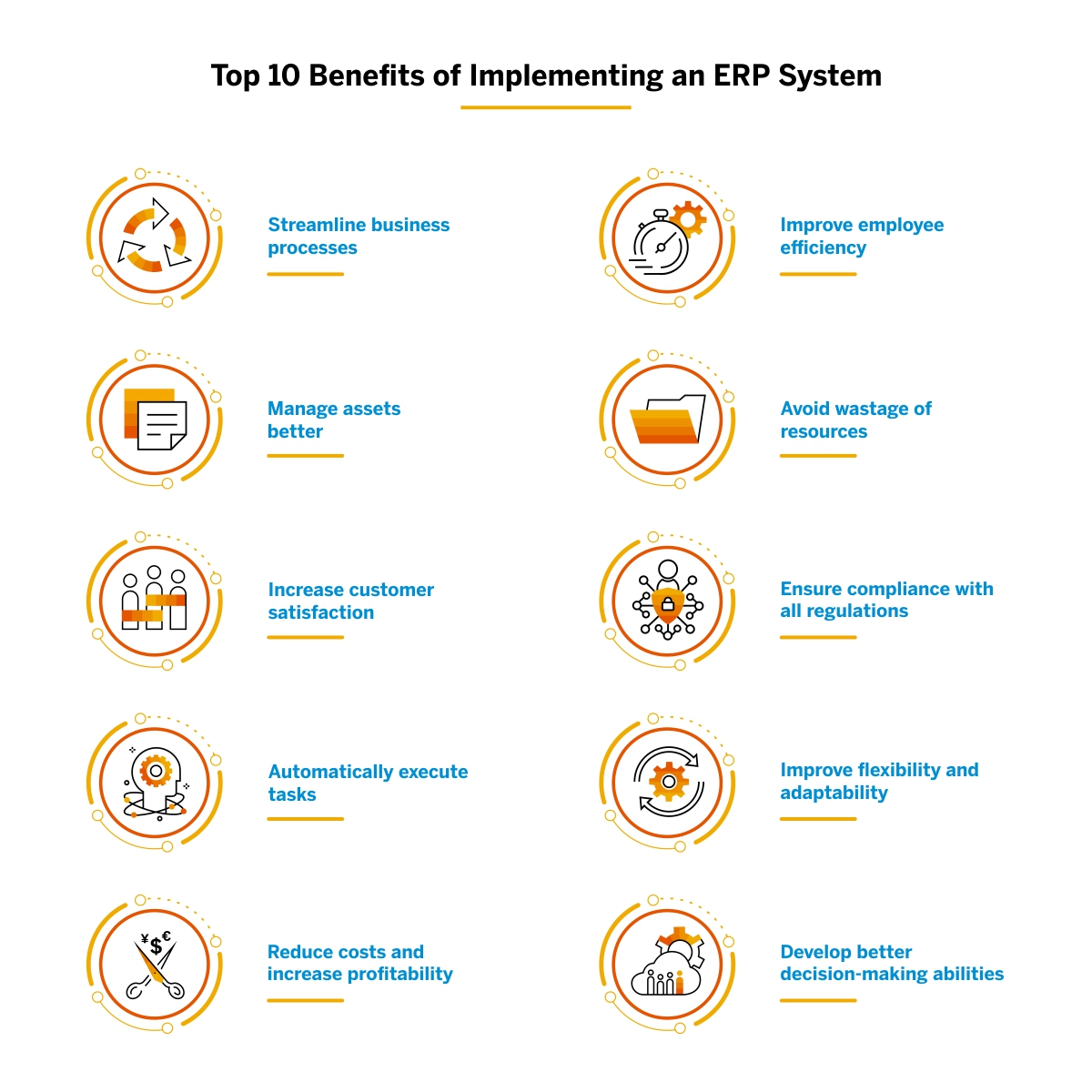Modern enterprises are complex, not only in the number of business processes but also in the division of operational functions. And enterprise resource planning (ERP) has done much to ease the complexity in business operations. An ERP system helps to centralize your diverse databases of information, automate specific routine tasks, and simplify processes, thus bringing in efficiency. The system takes care of the various processes in finance, manufacturing, supply chain, services, procurement, and other departments. This is done by segregating the functions of these departments and enabling them to coordinate with each other simultaneously. In other words, ERP helps each department to function on its own, while integrating all the business processes into a single system using shared and integrated databases and workflow standardizations.
Among the most important benefits of an ERP system is the ease of use it brings to a business. The advantages that an ERP offers have led to massive adoption, and now no business is without it to run day-to-day operations.
ERP systems use intelligent technologies to help organizations transform their mission-critical processes. This is achieved through technologies including artificial intelligence, machine learning, and advanced analytics. Equipped with these technologies, ERP can help transform business processes with intelligent automation that offers real-time processing speeds and a dramatically simplified data model. These advantages of ERP systems allow an organization to improve its operational and functional facets. These include improvements in the operational, managerial, strategic, IT infrastructure, and organizational aspects of a firm.
ERP systems also enable the organization to adapt to changes in the market rapidly. This is especially helpful for big businesses, which are not agile because of their size. ERP systems, such as the one from SAP, achieve this through features such as-
- Built-in machine learning and digital assistants
- Advanced analytics
- Continuous innovation and updates delivered via the cloud
- Flexible, scalable, and maintenance-free platforms
- Fast deployment and ease of use on any device
An ERP system or module can therefore be handy for any business and help it to deliver
- Better customer satisfaction
- Improved vendor performance
- Increased flexibility
- Reduction of lead time
- On-time shipments
- Increase of inventory turns to over, cycle time, and works in progress
- Reduction in quality costs
- Improved resource utility
- Improved information accuracy, and
- Improved decision-making capabilities
But ERPs aren’t for large enterprises alone. Irrespective of whether you are a growing business or a medium-sized enterprise, implementing an ERP system brings myriad benefits. Here are the top 10 benefits of implementing an ERP system.

- Helps streamline all business processes
Organizations comprise of multiple functions that need to work in coordination with each other to ensure smooth operations and profitability. However, achieving synergy among the different departments of an organization is not easy. As the processes going on in different parts get more complex, the efficiency of the entire enterprise can get affected. This might result in reduced efficiency.
Therefore, it is imperative for your business to keep a centralized node where information can go to and from all other parts of the business. An ERP module does just that. As information is shared and work coordinated with others, each department attains optimum levels of functioning. This increases efficiency.
- Helps improve employee efficiency
By implementing ERP systems, the companies can attain strategic benefits in the human resources department too. These benefits are achieved through
- Aligning individual and team goals with the corporate goals and strategies
- Standardizing and better organizing employee reviews and appraisals
- Effectively identifying and rewarding good performers
- Devising optimal compensation frameworks
- Helping ensure safe working conditions for all employees in your maintenance department
- Maintaining the reliability of the technical system of an organization
Besides this, by providing real-time access to customer and market data to the employees, ERP systems help them make better-informed decisions. This also increases the efficiency of the workforce.
- Helps manage assets better
Business assets include capital, raw materials, and infrastructure for the workforce as also information and data resources. These assets require a framework under which they can be managed.
By sharing data and information with the stakeholders within and outside an organization, ERP systems help manage assets better and improve operational performance. As ERP ensures all stakeholders have visibility into the same information and process flow, getting the best out of assets becomes easier. This is done through
- Integrated scheduling to allocate and optimize resources. These resources include people, tools, and materials
- Comprehensive management of environment, health, and safety data. ERP systems also perform response and analysis functions.
- Proactive task identification, management, and execution. These help to improve safety, environmental impact, and operational results.
- Completing planned and unplanned maintenance tasks in an efficient manner
- Addressing emergencies quickly and effectively
- Enabling maintenance planners to proactively monitor important and time-sensitive work across maintenance activities and spare parts inventory
- Enhancing maintenance efficiency with fast access to analytics on costs, breakdown rates, and damages
- Building schedules by simulating scope and workload, and track work status
- Helps in avoiding wastage of resources
The implementation of an ERP system allows businesses to track demand from customers. The ERP systems make this possible by accessing the data from different departments like sales, service, and marketing. Tracking customer requirements will help manage inventory better. It also ensures that stocks are available, that manufacturing meets the demand, and that the company does not produce too much or too less. In fact, ERP is a boon for just-in-time production, a model that manufacturers are increasingly adopting the world over. ERP systems also provide and process customer behavior data for an organization. This helps the firm to get a better understanding of the customer needs for customized products and services.
Achieving optimum production levels also saves resources and prevents losses on account of wastage. Maintenance operations in an organization are also optimized through ERP systems. This enables the technicians to detect, report, and resolve malfunctions in time. ERP systems also automate processes for inspecting, maintaining, and restoring infrastructure. These help to reduce costs and avoid wastage.
These systems also allow for the planning, scheduling, and execution of maintenance procedures with integrated and coordinated processes. This reduces reaction time and strengthens the organization’s problem-solving capabilities.
- Increases customer satisfaction
ERP systems gather and help your organization analyze data from customers. This is done by analyzing customer experience strategies. Accurate data about customers’ purchase history, buying behavior and feedback can be used for this purpose. This helps in identifying the product and service mix that best satisfies your customers. It also helps your organization to deliver a better interactive experience for the customers.
ERP modules also allow your firm’s employees quick access to all this data, so that they can understand the needs and serve the customer on the go. Better customer service leads to greater customer satisfaction. This, in turn, develops customer loyalty and helps spread good word of mouth for the company.
- Ensures compliance with all regulations
Every industry is governed as per regulations. It’s imperative that organizations comply with regulatory and statutory requirements. Violating these regulations can lead to fines, bad publicity, and other adverse outcomes. It can even lead to the shutting down of the business. A sound ERP system can take care of all the regulations by preventing errors and mistakes that can lead to violations. For example, ERP systems can help an organization to ensure compliance through
- Providing alerts and reminders for all aspects of a business
- Ensuring compliance with environmental protection regulations by making sure that all equipment is running at optimum standards
- Creating and managing all the contracts in one solution
- Deploying enterprise-wide legal document management for increased transparency
- Simplifying and automating contracting processes to ensure complete legal protection and compliance.
- Automatically executes tasks
The data generated by different processes in a company is immense. This data needs analysis, and other functions like scheduling tasks, deciding operations, making amendments, and devising strategies depend on how well the data is processed.
The processing of all this data traditionally required a manual workforce. However, the time and human resources spent on data processing can be saved by implementing an ERP system. As an ERP system automates data processing and executes assigned tasks without the requirement of human interference, precious time and other resources are saved. It also leads to better customer service as automated platforms can interact with them independently.
- Provides flexibility and adaptability
ERP systems centralize data processing and sharing between multiple units of your business. This infuses agility and flexibility in your business. As each department knows its own functions and becomes responsive to the functioning of others, adaptability is also achieved through better problem detection and solution capabilities.
For example, with the help of the data processed through ERP systems, your organization can streamline accounting and finances. This allows for better consolidation, scheduling, workflow management, and collaboration in the workforce of a firm. Using ERP modules, you can also keep track of payments and cash flows. Through analyzing and allocating cash and payments in real time, you can even set up in-house banks or payment centers.
ERP modules also help an organization to increase the agility of its finance processes. This can be done through the end-to-end analytics abilities of the ERP system, which includes
- Unified transactions, analytics, and planning to enhance the entire financial and accounting framework
- Streamlined, intelligent automated processes for greater throughput
- Subscription and usage-based billing models to fit any business’ individual needs
- Actionable insights and recommendations at the point of decision for real-time evaluation.
- Saves costs
ERP systems also help in cost management through comprehensive analytics, reducing loss and increasing profitability. ERP systems also enable an organization to assess profit and margin contribution with real-time reporting, predictive analytics, and integrated business planning. Other ways through which an ERP system can help you save costs include
- Delivering consolidated invoices, managing credit scoring, resolving disputes with a complete view of the customer, and simplifying accounting and financial processes
- Combining financial and management accounting and profitability data into a single universal journal
- Managing joint venture accounting and closing your books in real time with less effort
- Complying with new statutory regulations for revenue recognition while supporting existing requirements
- Gaining flexibility by decoupling revenue recognition rules from order entry and billing systems
- Improving treasury and financial risk processes
- Manage enterprise risk and compliance effectively
- Integrating and automating processes for risk management, compliance assurance, and international trade
- Optimizing space utilization, cost, and occupancy by actively managing lease agreements, investments, and construction projects.
Through better use of data and information, ERP systems also help devise strategies and plans for risk prevention, mitigation, and management. This can be done by better managing investigations and follow-up activities to reduce injury, illness, and incident rates. Other potential costs, penalties, fines, and unplanned downtime associated with environment, health, and safety can also be reduced with the help of an ERP system.
- Develops better decision-making abilities
Availability of accurate information is an asset in itself. ERP modules not only provide this information, but also help you organize and analyze the information quickly and in time. This helps your company’s decision-making process to become fast and accurate.
For example, the ERP systems can make available all the data and information of your sales and purchases departments to the finance and accounting sections. With the right data available at the right time, finance teams can make decisions faster and develop prudent strategies, including predicting cash flow accurately, managing liquidity efficiently, and mitigating risk proactively.



